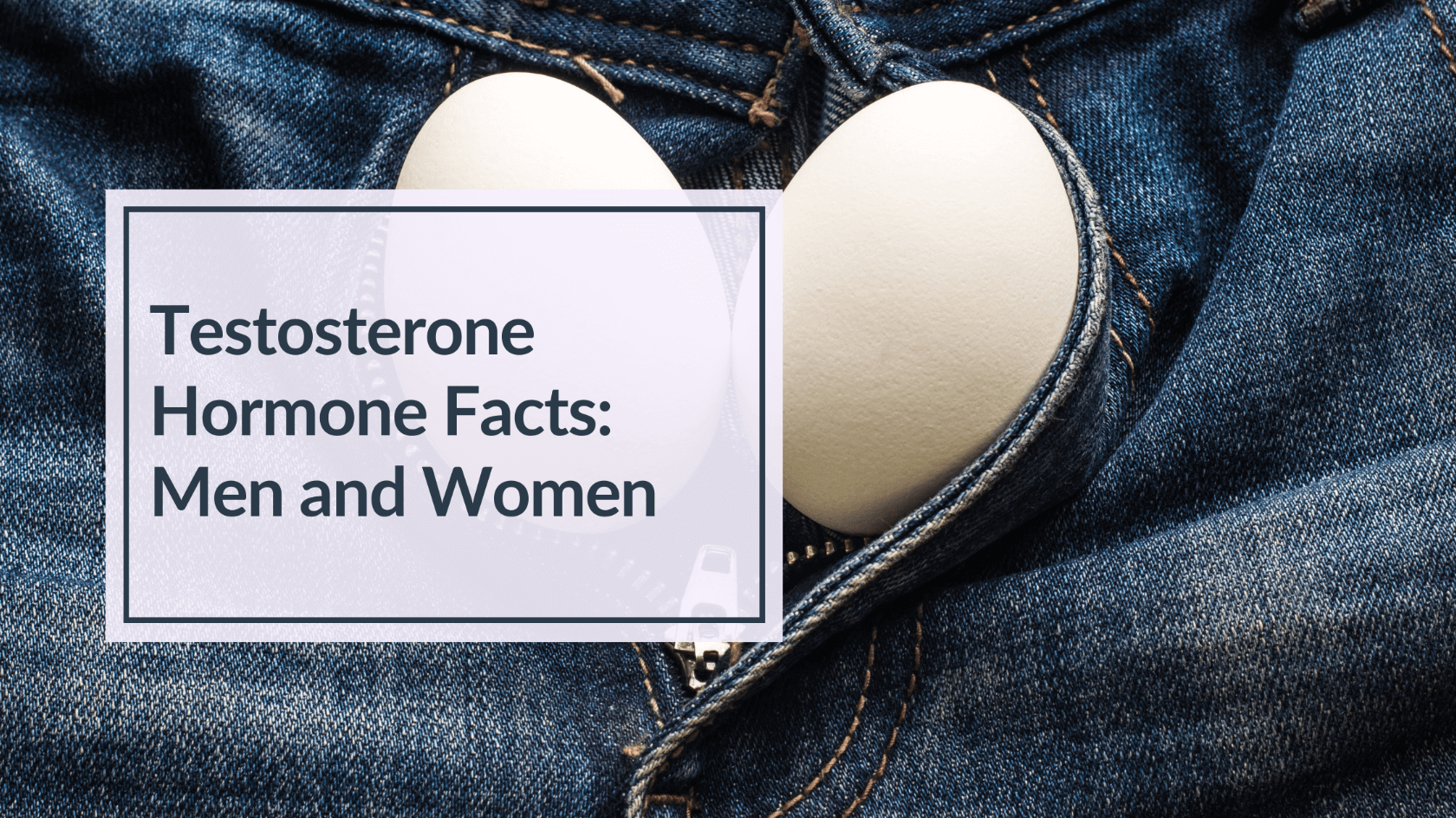
Understanding Testosterone Hormone Facts
Testosterone. Just say the word out loud, and you might cringe. That’s because it’s one truly misunderstood hormone! Testosterone hormone facts go way beyond the stereotypical label of men with “too much testosterone.” We want to go past the macho stereotype – that aggressive, dominating, hypersexual, and impulsive male image. While it seems they’re the ones with all the muscles, short fuse, and always up for risky stuff, they need balance in their hormones, too!
On the flip side, a man with low testosterone is perceived to have less muscle, less mojo, and is prone to emotional rollercoasters. Men might seem passive and unsure and struggle to step up in social or work situations.
For women, the idea of producing testosterone might be a shock. But it’s actually quite important for both sexes!
In this article, we’re digging into the testosterone hormone facts for both men and women and why it matters. When testosterone levels are normal, it does some amazing things to keep the male and female human body healthy. Understanding testosterone goes beyond dispelling stereotypes; it’s about recognizing its significance in promoting well-being.
Intro to Hormones: What Are They?
Before focusing solely on testosterone hormone facts, let’s look at hormones overall.
Hormones are chemical messengers produced by various glands in the Endocrine System. They help regulate many physiological processes in the body, including metabolism, growth and development, mood, and reproduction.
The Endocrine System is a complex network of glands and organs that produce, store, and release hormones into the bloodstream, where they travel to target cells or organs to exert their effects. Hormones can influence multiple systems in the body, including the Nervous System, Immune System, Urogenital System, and Cardiovascular System.
Hormones also influence each other. Aside from testosterone, some of the key hormones included in our bioenergetic testing process are in both the male and female sex hormone groups. We’ll discuss how testosterone influences them shortly.
Female Sex Hormones:
Progesterone: Primarily produced in the ovaries, progesterone is a calming hormone that regulates the menstrual cycle and prepares the uterus for pregnancy. It is the principal hormone of the second half of the menstrual phase.
Estrogen: Along with progesterone, estrogen is key to reproductive health. There are 3 types of estrogen: estrone (E1), Estradiol (E2), and Estriol (E3). If you look at this sample report, you will see that only estrogen is listed under the bioenergetic imbalances. We do not test for the 3 variants of estrogen, and we explain that later in the post!
Understanding these types of hormones and how they relate to reproductive health and life stages is important.
Estrone (E1): Produced by fatty tissues and the adrenal glands, estrone contributes to overall estrogen levels in women and plays a role in postmenopausal health. This is called the major postmenopausal hormone because it is the primary form of estrogen your body will make if you are postmenopausal.
Estradiol (E2): This is the most potent estrogen form because it regulates many body systems! Without estradiol, the menstrual cycle would not be regulated. Estradiol helps develop female reproductive tissues and secondary sexual characteristics. It also influences bone health and protects the Cardiovascular System. Loss of E2 raises the risks of osteoporosis and cardiovascular disease in postmenopausal women.
Scan tip: If you see amylase in your digestive enzymes section, look to the hormone section of the report. Salivary flow changes in menopause due to the drop in estrogen, or E2! Besides needing some hormonal support, you may also need support for your oral health and saliva flow!

Male Sex Hormones:
Dehydroepiandrosterone (DHEA): This hormone is produced in the adrenal glands and is involved in creating other sex hormones, including testosterone and estrogen. It is often called the youth hormone! This hormone is considered a precursor to estrogen and progesterone. It may even play a role in muscle mass decline as we age.
Androstenedione: A precursor to testosterone and estrogen, androstenedione is built from DHEA. This happens in the adrenal cortex, where it can be made into estrone or testosterone. It can contribute to overall androgen levels in men.
Estradiol and Other Estrogens: While estrogen is typically associated with females, men also produce small amounts. In men, estrogen plays a role in bone health, libido, and cardiovascular function.
These hormones, and others like insulin, growth hormone, and thyroid hormones work together to maintain balance and homeostasis, ensuring the proper functioning of various physiological processes.
Now that you understand the basics of some hormones, let’s look at specific testosterone hormone facts for both men and women.
Testosterone Hormone Facts Beyond the Testes
Testosterone, a hormone central to numerous physiological processes, is primarily synthesized in the testes in males, with smaller quantities produced in the ovaries and adrenal glands in females. Due to biological differences in hormonal regulation, men typically have higher levels of testosterone than women. Research suggests that the testes produce significantly more testosterone than the ovaries, leading to higher circulating levels in men.
Effects of Testosterone in Men:
- Reproductive System: Testosterone is essential for developing male reproductive organs, including the testes and prostate. It stimulates sperm production and supports fertility.
- Integumentary System: Testosterone stimulates the growth of facial and body hair, contributing to male secondary sexual characteristics.
- Locomotor System: Testosterone promotes bone density and muscle growth, contributing to overall strength and stability. It also helps maintain muscle mass and strength.
- Blood System: Testosterone stimulates the production of red blood cells, aiding in proper oxygen transport throughout the body.
- Endocrine System: Testosterone regulates hormone production in the endocrine system, influencing metabolism and energy levels. It binds to androgen receptors in various tissues, affecting gene expression and cellular functions.
- Nervous System: Testosterone levels affect men’s mood, cognitive function, and overall well-being. It is a driving force for sexual desire and arousal.
Effects of Testosterone in Women:
- Reproductive System: Testosterone contributes to libido, plays a role in ovarian function and egg development by inducing progesterone production, and supports bone health. Imbalanced testosterone may also lead to infertility if there is high plasma testosterone. This may lengthen the follicular phase of the menstrual cycle and may increase the risk of amenorrhea.
- Locomotor System: Testosterone helps maintain muscle mass and strength in women. It also promotes bone density and muscle growth, contributing to overall strength and stability.
- Endocrine System: Testosterone influences hormone balance and metabolism in women. It can be converted into estradiol, a potent form of estrogen, which is important for maintaining reproductive health.
- Nervous System: Testosterone levels impact women’s mood, cognitive function, and overall vitality. It also plays a role in sexual desire and arousal.
- Other Sex Hormones: helps regulate the secretion of luteinizing hormone (LH) and follicle-stimulating hormone (FSH), which are critical for reproductive function and hormone balance.
- Blood System: The actions of testosterone on the Blood System are no different in women. It stimulates the production of red blood cells, contributing to proper tissue oxygenation.
Testosterone levels can vary widely between individuals and are influenced by factors such as:
- age
- health status
- genetic predisposition
Additionally, testosterone levels can fluctuate throughout life due to factors such as puberty, aging, and hormonal changes. Testosterone levels in men and women naturally fluctuate within a certain range. However, if levels consistently drop below that range, the symptoms of low testosterone will occur.
Conventional blood tests to test for hormones are not always accurate and may not fully capture the dynamic nature of hormonal fluctuations. They may fail to reveal the intricate nuances of hormonal balance, leaving potential imbalances undetected.
Two of those intricate nuances are these endocrine organs: the Pituitary gland and the Hypothalamus.
Scan tip: Both of these endocrine glands control testosterone production and release. If your report shows energetically low testosterone, look to the pituitary or the hypothalamus as a link.
In contrast, while not diagnostic, bioenergetic testing offers a holistic approach to understanding hormonal health. We test the body’s energy systems to identify imbalances and stressors that may affect hormone levels. Energy testing can detect disturbances in the body’s bioenergetic field by measuring subtle energy frequencies, offering insights into potential hormonal dysregulation.
What Happens When You Have Too Much Testosterone
High testosterone levels in men can lead to:
- increased risk of cardiovascular problems
- including high blood pressure and heart disease
- aggression
- mood swings
- acne
High testosterone levels in women can lead to:
- irregular menstrual cycles
- excessive facial and body hair growth (hirsutism)
- acne
- hair loss
- conditions like Polycystic Ovary Syndrome (PCOS)
- What Happens When You Have Too Little Testosterone
Low testosterone levels in men can lead to:
- reduced body and facial hair
- decreased libido
- erectile dysfunction
- infertility
- reduced muscle mass and strength
- increased body fat
- increased breast size
- difficulty sleeping
- fatigue
- mood changes such as depression and irritability.
Low testosterone levels in women can lead to:
- decreased libido
- fertility problems
- missed or irregular menstrual periods
- vaginal dryness
- weight gain
- changes in breast tissue
- fatigue
- reduced muscle mass
- bone density loss (osteoporosis)
- changes in mood and cognition.
Maintaining a Healthy Testosterone Balance
Now that you have the testosterone hormone facts, here are 7 ways to help maintain a healthy testosterone balance for both men and women.
-
- Regular Exercise: Aerobic and strength training exercises can help maintain healthy testosterone levels.
- Balanced Diet: Consuming a diet rich in whole foods, including lean proteins, healthy fats, fruits, and vegetables. Using food to balance blood sugar can also help heal the metabolic pattern of elevated insulin and insulin resistance that contributes to elevated testosterone, inflammation, and hormone imbalance.
- Nutritional Support: To support hormone balance, consider supplementing with vitamin D, ashwagandha, ginger tea, L-carnitine, and maca. Green tea has been shown to increase sex hormone binding globulin (SHBG), which can bind up excess testosterone in the body if indicated. EGCG, found in green tea, is also an incredible antioxidant and has anti-cancer properties.
- Stress Management: Stress-reduction techniques such as meditation, deep breathing exercises, and yoga can help lower cortisol levels and maintain testosterone balance.
- Adequate Sleep: Getting enough quality sleep is essential for hormone regulation, including testosterone production.
- Limiting Alcohol and Tobacco: Excessive alcohol consumption and smoking can negatively impact testosterone levels, so moderation is key.
Get a Full or Balancing Scan: Bioenergetics testing can help you identify stressed systems and hormones.
Booking a consultation with one of our practitioners can help you explore deeper connections and assist you in creating balanced health.
DISCLAIMER: Balanced Health, LLC/CBH Energetics and any parent, subsidiary, affiliated, or related entities and companies do not provide medical advice or services. This post and the bioenergetic products and services offered by Balanced Health, LLC/CBH Energetics including, but not limited to, bioenergetic tests, bioenergetic scans, bioenergetic reports and related products and services (collectively the “Bioenergetic Products and Services”) are designed for educational and informational purposes only and are not intended to diagnose, treat, cure, or prevent any disease, condition, complaint, illness or medical condition and are not a substitute for professional services or medical advice. Testing is not used for the purpose of obtaining information for the diagnosis, prevention, or treatment of disease or, the assessment of a health condition or for identification purposes.
